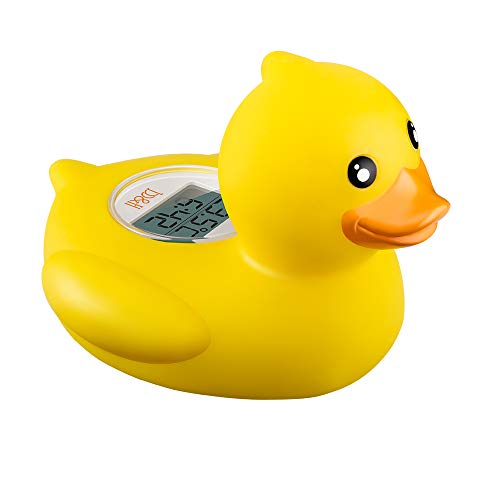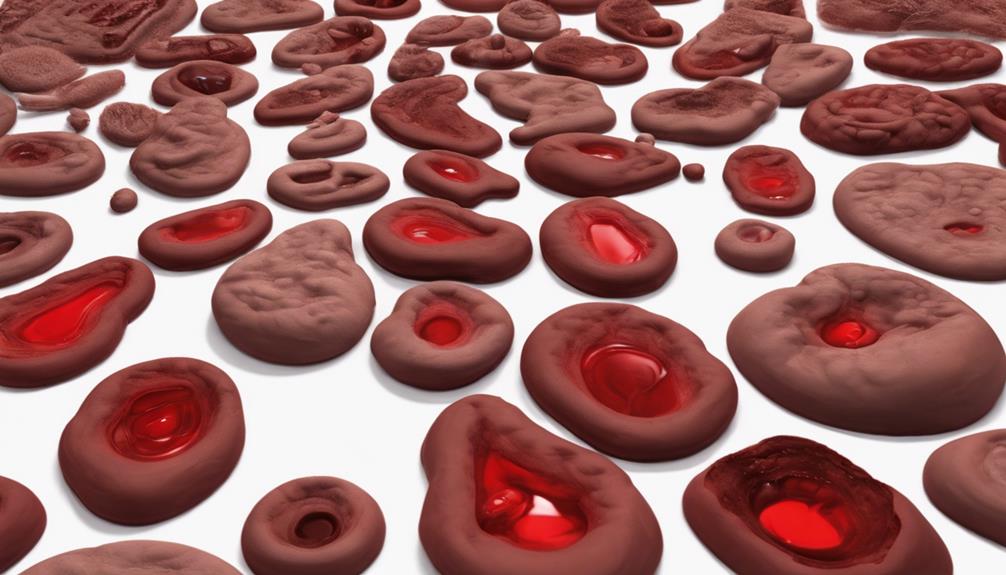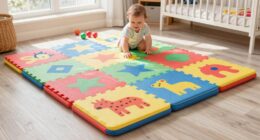Ever wondered how to ease a newborn's discomfort when they're struggling to poop? When it comes to helping a little one in need, we understand how important it is to find effective solutions.
In this discussion, we'll explore seven practical ways to assist a newborn experiencing difficulty with bowel movements. From simple techniques like dietary adjustments to more hands-on approaches such as massage techniques, each method plays an essential role in providing relief.
Stay tuned to discover the best ways to support your newborn through this common challenge.
Key Takeaways
- Adjust feeding frequency and introduce fiber-rich foods for bowel regularity.
- Use warm baths to relax muscles and stimulate digestion.
- Practice tummy time to strengthen core muscles and aid in relieving constipation.
- Try gentle bicycle legs and massage techniques to promote bowel movements and alleviate discomfort.

BioGaia Protectis Baby Probiotic Drops | Baby Essentials for Colic & Gas Relief | Safe for Newborns | Ease Crying, Fussing, Colic, Gas, Spit-ups & Constipation | No Dairy, Soy & Gluten | 5mL
SOOTHES CRYING, FUSSING, COLIC & GAS: For over 20 years, BioGaia Baby has been soothing babies with colic…
As an affiliate, we earn on qualifying purchases.
As an affiliate, we earn on qualifying purchases.
Dietary Adjustments
When addressing a newborn straining to poop, dietary adjustments play an important role in easing their discomfort and promoting regular bowel movements. Breast milk or formula should be the primary source of nutrition for infants, as they provide essential nutrients for growth and development. For breastfed babies, ensuring they're nursing on demand can prevent dehydration and aid in maintaining regular bowel movements. In cases where formula feeding is necessary, adjusting the feeding frequency according to the baby's needs can also contribute to bowel regularity.
Introducing solid foods like fruits and vegetables rich in fiber can help alleviate constipation in newborns. Pureed prunes or peas are excellent options to consider, as they can soften stool and facilitate easier passage. It's vital to avoid constipation-triggering foods like bananas or rice cereal, as they may worsen the condition. Additionally, incorporating probiotic-rich foods such as yogurt or kefir into the baby's diet can promote healthy digestion and support overall gut health. By making these dietary adjustments, parents can play a proactive role in ensuring their newborn's comfort and well-being.

b&h Baby Bath Thermometer, The Infant Bath Floating Toy Safety Temperature Water Thermometer, Baby Bath Essentials (Classic Duck)
Measuring water temperature in the bathtub and room. Not only a thermometer, but also a clock. baby thermometer…
As an affiliate, we earn on qualifying purchases.
As an affiliate, we earn on qualifying purchases.
Warm Baths
To further assist a newborn experiencing difficulty passing stool, incorporating warm baths into their routine can provide relief by relaxing their muscles and encouraging bowel movements through gentle stimulation. When it comes to helping your baby with constipation, warm baths can be a soothing and effective method. Here are some key points to take into account:
- Relaxing Muscles: The warm water helps relax the baby's muscles, including those in the abdominal area, which can aid in easing bowel movements.
- Stimulating Digestive System: The warmth of the water can stimulate the baby's digestive system, making it easier for them to pass stool and alleviate constipation.
- Comforting Experience: Bath time can offer a comforting and calming experience for the baby, reducing stress and tension that may be contributing to their difficulty with bowel movements.

Baby Einstein 4-in-1 Kickin' Tunes Music and Language Play Gym and Piano Tummy Time Activity Mat
The best-selling Baby Einstein 4-in-1 Kickin’ Tunes Music & Language Discovery Activity Gym supports fine and gross motor…
As an affiliate, we earn on qualifying purchases.
As an affiliate, we earn on qualifying purchases.
Tummy Time
Engage your newborn in tummy time sessions to strengthen core muscles and assist in relieving constipation. Tummy time is a vital yet effective way to support your baby's bowel movements and overall well-being. By placing your baby on their tummy for short periods each day, you can help alleviate constipation, gas, and discomfort. This position helps apply gentle pressure to the abdomen, promoting the natural movement of stool through the intestines.
Not only does tummy time aid in addressing constipation, but it also plays an essential role in enhancing your baby's development. It helps strengthen neck muscles, improve motor skills, and encourage sensory exploration. By incorporating tummy time into your daily routine, you aren't only supporting your baby's digestive health but also laying the foundation for their physical and cognitive growth. Embrace these moments of bonding and development as you engage in tummy time with your little one.

SEREED Baby Balance Bike for 1-2 Year Olds – 4 Wheels, First Bike for Toddlers, Birthday Gift (Green)
GROW IN FUN: Recommended ages for 12-24 months. The infant balance bike is the best birthday gift for…
As an affiliate, we earn on qualifying purchases.
As an affiliate, we earn on qualifying purchases.
Bicycle Legs

As we continue to support our newborn's digestive health, let's explore the beneficial practice of bicycle legs.
When days since your baby last had a bowel movement start to pile up and signs of constipation like stomach pain become apparent, bicycle legs can be a gentle and effective way to help alleviate their discomfort.
Here are some key points to take into account:
- Natural Remedy: Bicycle legs are a safe and simple technique that can serve as a natural remedy for breastfed babies struggling to poop.
- Stimulation: This movement aids in stimulating the baby's digestive system, potentially promoting bowel movements without the need for a glycerin suppository.
- Comfort: Make sure to provide proper support for your baby's legs and move them gently to prevent any strain or discomfort during the exercise.
Massage Techniques
Incorporating gentle massage techniques into your daily routine can provide comfort and support for a newborn struggling with constipation.
Gently massaging your baby's belly in a clockwise motion can help relieve gas and promote bowel movements. You can also try using the 'I Love U' massage technique by tracing the letter 'I' down the left side of the baby's belly, across the belly button, and up the right side to aid in relieving constipation.
Applying light pressure with your fingertips in a circular motion around the baby's navel can stimulate the digestive system and alleviate discomfort. Additionally, massaging the baby's lower back in a gentle, rhythmic manner can help relax the muscles around the rectum and encourage bowel movements.
Remember to be gentle and responsive to your baby's cues during the massage. These techniques can be a soothing way to assist your little one in finding relief from constipation without resorting to fruit juice or potentially constipating baby foods.
Frequently Asked Questions
What to Do if Newborn Is Straining to Poop?
When a newborn is straining to poop, we can gently massage their belly, make sure they're well-hydrated, and encourage tummy time. If concerns persist, seeking guidance from a pediatrician is crucial for proper evaluation and support.
How Long Does Straining to Poop Last in Newborns?
We comprehend the concern around newborns straining to poop. This common issue, lasting about 10-20 minutes, is due to muscle development. While alarming, it usually resolves as coordination improves. Trust the process, seek guidance if worried.
How Can I Ease My Newborn's Poop?
We can ease your newborn's poop by massaging the belly, ensuring hydration, doing bicycle leg movements, and allowing relaxation during diaper changes. If excessive straining or distress persists, consult the pediatrician for further guidance.
How Do I Unconstipate My Baby?
When we notice our baby struggling with constipation, we should try gentle belly massages, encourage tummy time, offer small sips of warm water, and do bicycle leg exercises. If issues persist, consulting a pediatrician is crucial for guidance.
Conclusion
To sum up, when your newborn is struggling to poop, remember that gentle methods like dietary adjustments, warm baths, tummy time, bicycle legs, and massage techniques can offer relief.
It's important to be patient and consistent in implementing these strategies to help your little one feel better.
As the saying goes, 'An ounce of prevention is worth a pound of cure.' Remember to seek guidance from a healthcare provider if the issue persists for further support.
Your baby's comfort and well-being are top priorities.









